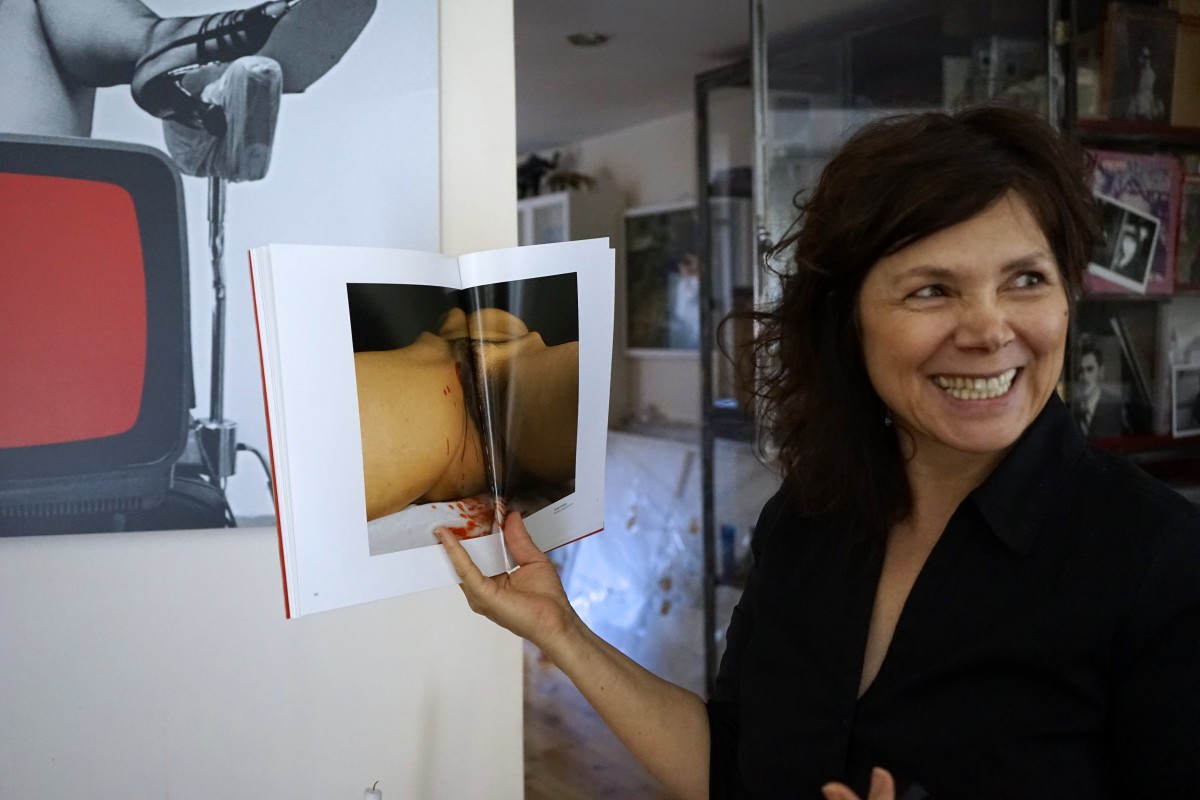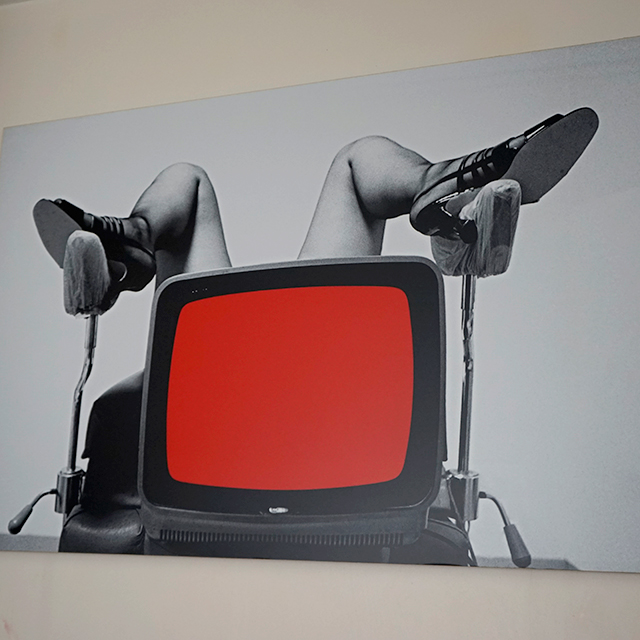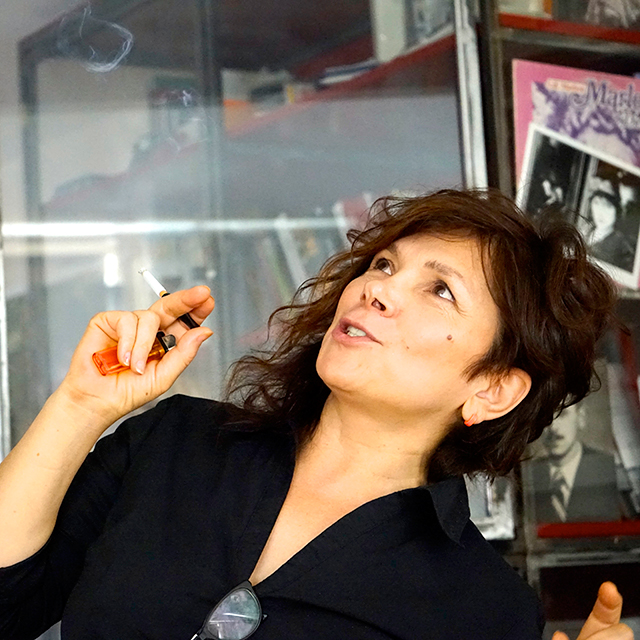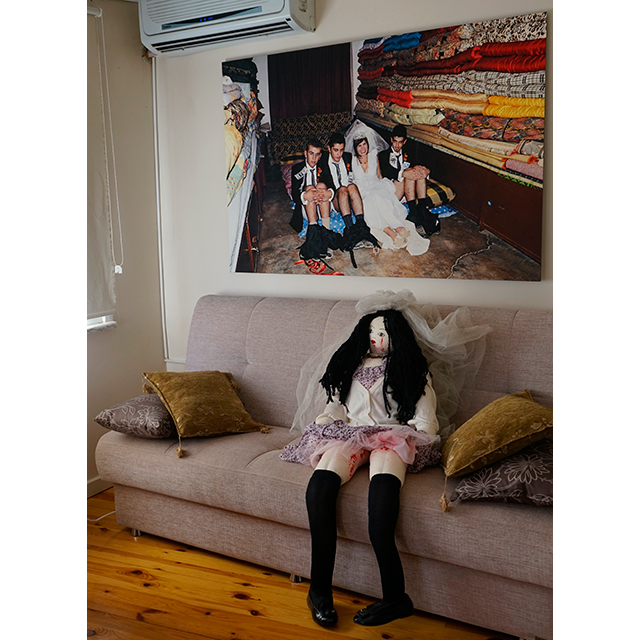Şükran Moral lives in an Istanbul neighborhood that shall remain unnamed because it hasn’t been very long since she stopped receiving death threats and started feeling almost safe again. The threats came after a controversial 2010 performance focused on two lesbians. It, like many of Moral’s performances, challenged traditional gender roles and sexuality: In a cosmopolitan, though still-patriarchal, society she has staged works in brothels and men-only bathhouses; she has gone out into a small rural town and gotten fake-hitched to three young guys to highlight child marriage. The 2010 performance in particular was demonized as pornography and a campaign against Moral began in the government-influenced press. Men wrote to tell her they would “put a candle in your vagina” and burn her to death.
While art venues in Istanbul and other countries (including the Victoria & Albert Museum in the UK and the Thomas Olbricht Collection in Germany) have shown her work, acceptance in her home country remains complicated by sometimes disturbingly negative reactions. Nevertheless, Moral is a persistent force within Turkey’s burgeoning contemporary art scene.
This month she presents a video of her new work The Balcony Performance at Contemporary Istanbul, which runs from November 13-26. Moral’s latest performance mocks past and present dictators who celebrate their victories from balconies. In it, she barks at a balcony in a well-trodden part of Diyarbakır, a large city in southeastern Turkey. She’s dressed in a Hitler costume and the barking goes on for five… seven… ten minutes. People watching try to stop her but she keeps going, continuing on until Moral herself decides the performance is over.
I recently visited Moral at her apartment/studio in Istanbul. Now in her early fifties, her work is possibly still the most controversial of any female artist in Turkey, a country whose recent elections some fear may curtail artistic freedom.
—Rachel Friedman for Guernica
Guernica: Can you tell me about the performance in 2010 that incited death threats against you?
Şükran Moral: In 2010 I got many death threats after a performance at the Zilberman Gallery. There were 120-140 invitations that went out to art professionals for this exhibition. The performance was about two women having intercourse. Turkey is listed as one of the countries that watches the most porn in the world so the government-influenced press made a campaign against the exhibition just because of this sex scene. They interpreted it as pornography as if they had never seen something like this. If this performance had happened in a discotheque or a club it would have been accepted. The fact that it’s the idea of an artist is what they are against. It’s too much of a statement for them. It was too in their face. It turned the performance from an exhibition into a social issue.
Guernica: Is your work affected by censorship?
Şükran Moral: Already life was difficult. The 2010 performance made it worse. I really have a warrior personality so I’m going to use the press articles about me for a book. I’ve been collecting all of it. I’ve complained to the government about this harassment. I became a target.
I love being here but none of us are really safe here.
Guernica: Do you feel safe now?
Şükran Moral: I was not safe back then. I love being here but none of us are really safe here. We just deal with it.
Guernica: Is the situation getting better or worse for you and your work?
Şükran Moral: I’ve been working for twenty years in the art world. Since the beginning, my art has been provocative and it’s bringing up to surface the issues that women have. In 1997, I participated in the Biennial with a project called Bordello. They ignored me at the beginning at the Biennial. Nothing was written about in print. My name wasn’t mentioned anywhere even though it was a really important statement. So all of these performances—in the bordello and the one in the hamam—are starting to be mentioned in the last few years. I have works in the British Museum and I work internationally as well. But I’m very, very tired now. I’m tired of the government’s pressure and all the things I’ve been through in the past few years. Turkey’s situation is getting worse so when my generation is gone they are all going to be relieved.
Guernica: Will you stop showing?
Şükran Moral: Never. After a good night’s sleep, I get back at it.
Death threats are what you read about and see in movies and you wouldn’t think it would happen to you. After that, though, I’m stronger.
Guernica: Tell me about Married, with Three Men.
Şükran Moral: It was in a village in the south of Turkey. The performance was about three grooms and one bride because you know the thing about just one bride and many grooms and the problems of the young brides and old grooms: in Turkey we have girls married at very young ages and they swap girls between a family’s husbands. I come from a very modest family so that allows me to mix in with the people of the city as opposed to being from a big, rich family.
Guernica: How do you conduct research for your work?
Şükran Moral: It changes from one project to the next. An important thing in my creation is I know when it starts and when it ends. I really control that whole process, especially for videos. Each one of my projects is a long-term process. Like right now I’m working on the book about those death threats. The threats are really anonymous. They say things like: “We are going to put a candle in your vagina and burn you and torture you. We’re going to find your family as well and torture them. You’re gonna get killed you by a seventeen or eighteen year-old guy and we’re going to make him a martyr.” Death threats are what you read about and see in movies and you wouldn’t think it would happen to you. After that, though, I’m stronger. If I was a guy there wouldn’t be this reaction. On the contrary if a man had done this probably everyone would be applauding. This is a macho society. Not only the people of the country but also the art influencers.
Guernica: Who are the people and institutions that support you?
Şükran Moral: Women, students, homosexuals. I want support from institutions but don’t get any.
Guernica: Did anyone stand up for you when you were getting death threats?
Şükran Moral: Even my friends never called. They were afraid.
Guernica: Do international organizations support you?
Şükran Moral: They buy my works but there is no further statement of support.
Guernica: Are there other women artists working on controversial work like yours in Turkey?
Şükran Moral: There are a lot of young women performance artists but their works are not quite as provocative, not quite as controversial.
Guernica: Let’s go back to 1997 when you entered a men-only section of a hammam, a Turkish bathhouse.
Şükran Moral: Back then no one knew what was going on inside them. I was the first artist to show a video filmed inside a Hammam. A Polish artist did the same kind of performance a year later. He was invited to the Venice Biennial. And my performance was not spoken or written about.
Art history is all men with vertical penises. That’s enough penises!
Guernica: Can you tell me about this photograph on your wall of a woman’s legs in stirrups with a TV between her thighs?
Şükran Moral: It was done in 1996. There was, no internet. TV was important back then. TV is like a vagina. So she’s saying that my vagina is talking. The red is the blood. It’s blood of the vagina. The violence. This is the violence against the bride. Virginity. Art history is all men with vertical penises. That’s enough penises! Of course I’m not hating that work but it’s time to balance it out.
Rachel Friedman is the author of The Good Girl’s Guide to Getting Lost: A Memoir of Three Continents, Two Friends, and One Unexpected Adventure. She’s written for The New York Times, BUST, Creative Nonfiction, and others. She’s a contributor to The McSweeney’s Book of Politics and Musicals and The Best Women’s Travel Writing, Volume 9. She tweets @friedman_rachel.
Translated by Burcu Öztürkler and Ece Peliter.




